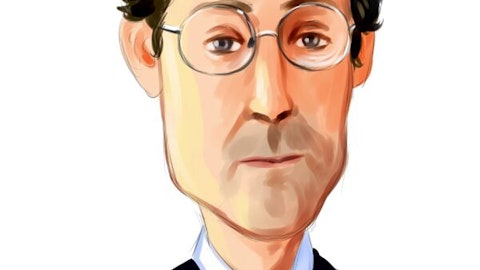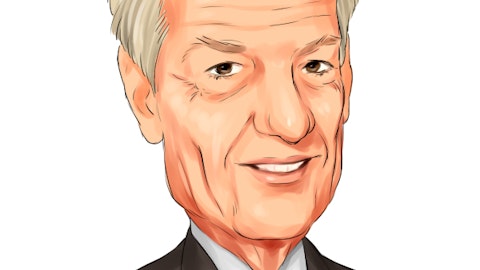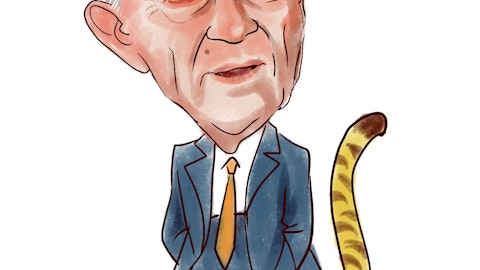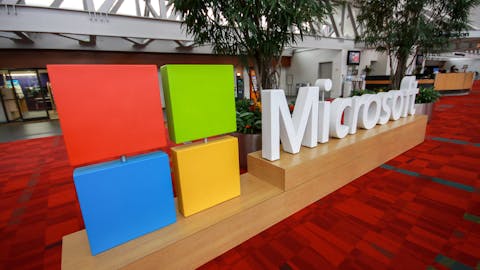Hedge fund legend Julian Robertson closed his hedge fund Tiger Management to outside investors way back in 2000 and has been using it as a vehicle to manage his own money since then. In the last 16 years that the fund has been closed to outside investors, its performance is unknown. However, if one takes a look at the estimated net worth of the octogenarian financier over the years, one can get a fair idea about Tiger Management’s performance during that time. According to Forbes, Mr. Robertson’s estimated net worth increased from $400 million in 2003 to $3.4 billion in May 2015,which means a gain of 750% in 12 years. Even if one discounts a large part of that gain as profits he has accumulated from seeding and investing in other hedge funds, the rest of it still points towards Tiger performing phenomenally well over that 12-year timeframe. Mr. Robertson has always been considered a great stock picker and has famously been quoted as saying:
“Our mandate is to find the 200 best companies in the world and invest in them, and find the 200 worst companies in the world and go short on them. If the 200 best don’t do better than the 200 worst, you should probably be in another business.”
With that kind of an aim, it’s clear that when Mr. Robertson decides to buy a stock, his decision is based mostly on the stock’s upside potential rather than factors like forward yield. However, some of his stock picks in recent years have included companies that boast a decent forward yield, which could make them doubly rewarding for dividend investors. Taking that into account, in this article we’ll take a look at five stocks that were a part of Tiger Management’s equity portfolio entering the fourth quarter and which currently sport an annual dividend yield of more than 2.5%.
At Insider Monkey, we’ve developed an investment strategy that has delivered market-beating returns over the past 12 months. Our strategy identifies the 100 best-performing funds of the previous quarter from among the collection of 700+ successful funds that we track in our database, which we accomplish using our returns methodology. We then study the portfolios of those 100 funds using the latest 13F data to uncover the 30 most popular mid-cap stocks (market caps of between $1 billion and $10 billion) among them to hold until the next filing period. This strategy delivered 18% gains over the past 12 months, more than doubling the 8% returns enjoyed by the S&P 500 ETFs.
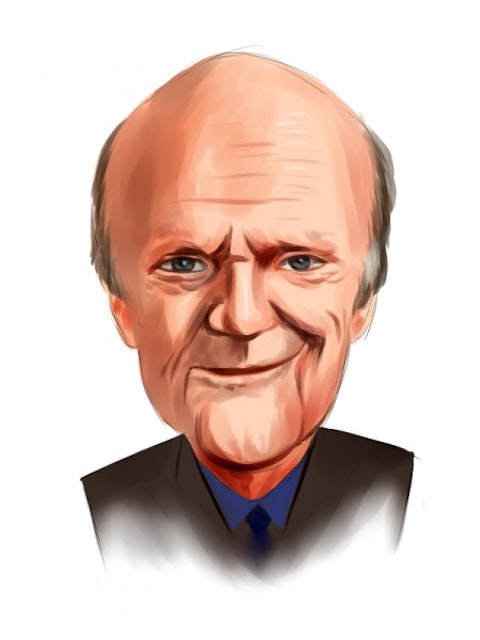
#5 MGM Growth Properties LLC (NYSE:MGP)
– Shares Held By Tiger Management (as of September 30): 40,000
– Value of The Holding (as of September 30): $1.04 Million
Let’s start with MGM Growth Properties LLC (NYSE:MGP), in which Tiger Management reduced its stake by 31% during the third quarter. MGM Growth Properties LLC (NYSE:MGP), a captive REIT of MGM Resorts International (NYSE:MGM), had its IPO in April and since then its stock has appreciated by 17.7%. In September, the company declared a quarterly dividend of $0.3875, which based on its current stock price translates into a forward yield of 6.27%. For its fiscal 2016 third quarter, MGM Growth Properties reported EPS of $0.48 on revenue of $154.8 million, missing analysts estimates by $0.01 and $15.34 million, respectively. On November 22, analysts at Buckingham Research initiated coverage on the stock with a ‘Buy’ rating.
Follow Mgm Growth Properties Llc (NYSE:MGP)
Follow Mgm Growth Properties Llc (NYSE:MGP)
Receive real-time insider trading and news alerts
#4 Anheuser Busch Inbev SA NV (ADR) (NYSE:BUD)
– Shares Held By Tiger Management (as of September 30): 10,919
– Value of The Holding (as of September 30): $1.43 Million
Tiger Management upped its stake in German brewing major Anheuser Busch Inbev SA NV (ADR) (NYSE:BUD) by 16% during the third quarter. Anheuser Busch Inbev SA NV (ADR) (NYSE:BUD)’s stock has taken a massive beating in the last month and owing largely to that, is currently trading down by 16.58% year-to-date. Nevertheless, this decline has been beneficial in the sense of pushing the stock’s forward yield higher, as it now stands at 3.88%. The recent downturn in the stock has been the result of a multitude of factors including the company missing analysts’ revenue and EPS estimates with its third quarter results, a surge in the treasury and dollar rates following billionaire Donald Trump’s election victory, as well as concerns about the next acquisition that the company will make. The Street has been rife with rumors over the past couple of weeks that Anheuser Busch Inbev is contemplating the purchase of Coca-Cola (NYSE:KO). However, most analysts believe that an acquisition of that enormous size would be difficult for the brewer to pull off due to financial constraints and regulatory hurdles.
Follow Anheuser Busch Inbev Sa Nv (NYSE:BUD)
Follow Anheuser Busch Inbev Sa Nv (NYSE:BUD)
Receive real-time insider trading and news alerts
We’ll check out three more of Robertson’s favorite dividend stock picks on the next page.
#3 Blackstone Group LP (NYSE:BX)
– Shares Held By Tiger Management (as of September 30): 640,400
– Value of The Holding (as of September 30): $16.35 Million
After reducing its stake in Blackstone Group LP (NYSE:BX) by 11% during the second quarter, Tiger Management further lowered its holding in the asset manager by 2% during the third quarter. Blackstone Group LP (NYSE:BX) lost a considerable amount of its market capitalization in the last 7 months of 2015. While its stock has mostly been range-bound this year, it is currently trading down by almost 10% year-to-date. Based on the dividend it has paid in the last four quarters, Blackstone Group’s 12-month yield currently stands at 6.26%. On November 21, Reuters reported that the asset management firm is in talks with Chinese insurance company Anbang to sell residential property assets worth $2.3 billion that it owns in Japan. If the deal goes through, it would be the largest property transaction in Japan since property prices peaked in 2007.
Follow Blackstone Inc. (NYSE:BX)
Follow Blackstone Inc. (NYSE:BX)
Receive real-time insider trading and news alerts
#2 Bristol-Myers Squibb Co (NYSE:BMY)
– Shares Held By Tiger Management (as of September 30): 400,800
– Value of The Holding (as of September 30): $21.61 Million
Bristol-Myers Squibb Co (NYSE:BMY) was a new entrant in Tiger Management’s equity portfolio during the third quarter. Shares of the biopharmaceutical company suffered a big drop in August after it announced that its drug Opdivo had failed to reach the endpoint of a phase III study in which it was tested for treating advanced non-small cell lung cancer. That drop was followed by another big decline in October when Bristol-Myers Squibb Co (NYSE:BMY) revealed that results from a phase III study on Opdivo, CheckMate-026, in treatment-naive patients with PD-L1-positive non-small cell lung cancer (NSCLC) failed to demonstrate an improvement in progression-free survival (PFS) compared to platinum-based doublet chemotherapy. Owing largely to those two declines, Bristol-Myers Squibb’s stock is currently trading down by more than 17% for 2016. The company currently pays a quarterly dividend of $0.38 per share, which translates into an annual dividend yield of 2.67%.
#1 Microsoft Corporation (NASDAQ:MSFT)
– Shares Held By Tiger Management (as of September 30): 458,300
– Value of The Holding (as of September 30): $26.4 Million
Tiger Management initiated its stake in Microsoft Corporation (NASDAQ:MSFT) during the second quarter and boosted it by 14% during the third quarter, making the company its third-largest equity holdings in terms of value at the end of September. Microsoft Corporation (NASDAQ:MSFT)’s stock has had a strong rally since the start of the second-half of 2016 and is currently trading up by 9% year-to-date. Despite that appreciation in the stock, it still sports a decent forward yield of 2.58%, which is one of the highest among large-cap tech companies. A large part of the gains that the stock has registered this year have come after it announced in June that it would be acquiring LinkedIn Corp (NYSE:LNKD) for $26.2 billion. According to Reuters, Microsoft is on the verge of getting approval for this deal from EU antitrust regulators, though it will come with some conditions attached. The company has already received approval for the deal from regulators in the U.S., Canada, Brazil and South Africa, without any conditions. On November 17, analysts at Goldman Sachs Group Inc. upgraded Microsoft’s stock to ‘Buy’ from ‘Neutral’ and also upped their price target on it to $68 from $60.
Follow Microsoft Corp (NASDAQ:MSFT)
Follow Microsoft Corp (NASDAQ:MSFT)
Receive real-time insider trading and news alerts
Disclosure: None
